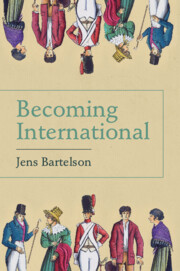Book contents
- Becoming International
- Becoming International
- Copyright page
- Dedication
- Contents
- Preface
- 1 Making Sense of the International
- 2 Dividing the World
- 3 Empire and Independence c.1776–c.1825
- 4 Empire and Self-Determination, c.1820–c.1919
- 5 The Empire of the International
- 6 From the International to the Global and Beyond?
- Bibliography
- Index
2 - Dividing the World
Published online by Cambridge University Press: 12 October 2023
- Becoming International
- Becoming International
- Copyright page
- Dedication
- Contents
- Preface
- 1 Making Sense of the International
- 2 Dividing the World
- 3 Empire and Independence c.1776–c.1825
- 4 Empire and Self-Determination, c.1820–c.1919
- 5 The Empire of the International
- 6 From the International to the Global and Beyond?
- Bibliography
- Index
Summary
Chapter 2 describes how Roman and medieval of notions of imperium were re-appropriated during the sixteenth and seventeenth centuries to describe the sovereignty claims of nascent states as well as to legitimize their territorial aggrandizement in Europe and beyond. Since early modern conceptions of sovereignty came with few restrictions on the scope of rule in terms of peoples or places that could be legitimately subjected to its authority, early modern authors made no categorical distinction between empires and states. But even if these authors had no clear conception of a distinctive international realm, they nevertheless developed a rich vocabulary for describing relations between different polities in and out of Europe. Many of those who resisted imperial aggrandizement during this period maintained that the quest for universal sovereignty violated the natural liberty of both individuals and states and proposed that upholding the balance of power between European empires cum states was crucial to the preservation of natural liberty. From this Enlightenment historians and lawyers concluded that European powers constituted a system of sovereign and formally equal states held together by public law and balance of power in equal measures.
- Type
- Chapter
- Information
- Becoming International , pp. 24 - 70Publisher: Cambridge University PressPrint publication year: 2023



